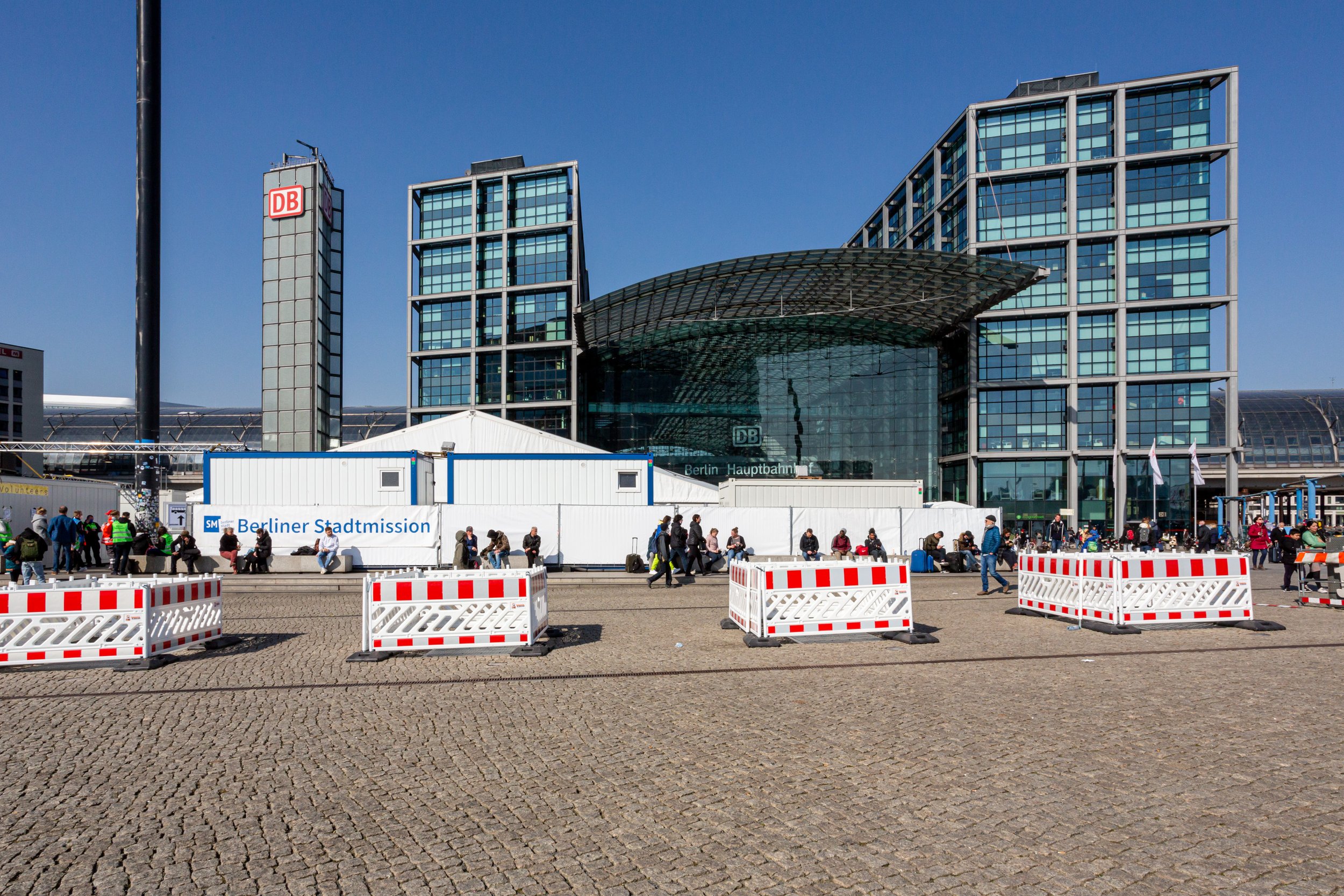Letter from Berlin: The War in Ukraine Pushes the City's Limits
Um diesen artikel auf Deustch zu lesen, klicken sie hier.
March 24, 2022
It's been four weeks to the day after the invasion of Ukraine, and the city of Berlin, which is where I'm writing from, is hitting its capacity, this time for real. The influx of Ukrainians fleeing the latest war started by Russia's newest dictator has left the Syrian refugee “crisis” of 2015 in the dust. On average, about 10,000 refugees from Ukraine have been arriving daily on trains, buses, and cars to a city that is already experiencing housing shortages, an understaffed city administration, and personnel shortages in all aspects of public life, from teachers and daycare workers to transit workers, police officers, and nurses and doctors.
The city is working around the clock to make it work, scraping together whatever materials and resources it can get its hands on and spending money hand over fist. And that's just on the public end of things. The private sector, including nonprofits, socially driven enterprises, and individual citizens have also mobilized in an unprecedented way with the unified goal of helping however they can.
For example, I live in Moabit and just in my neighborhood alone, at the big local supermarket, the cashiers ask if we would like to round our expenses up to the next whole Euro to donate to relief efforts for those stuck in Ukraine. Around the corner from our apartment is a small clothing shop where the pieces are designed and handmade on location. The store closed for almost two weeks as the women who run it collected donations and actually drove to the Polish-Ukrainian border to deliver them and administer medical aid. A neighbor of mine, of Russian origin, started volunteering during her time off from work at the main train terminal where she translated for new arrivals and helped them to connecting transport or to the welcome tent where those with no final destination are referred to temporary facilities. And since the ninth of March my family and I have been hosting a family of five Ukrainians—mom, dad, and three children—in our son's bedroom. They will be staying with us until mid-April, at least.
“All of this makes me both proud and disappointed.”
Of course, not all refugees have come to stay; some are in transit to family or friends in other parts of Germany or destinations beyond. They come to Berlin because it's a big city, it's close to the Polish border, and right after the start of the war the German rail company, Deutsche Bahn, offered free transit for anyone coming out of Ukraine. Many have arrived in Berlin with no place to go and in need of shelter, and to date the city has officially put up 20,000 people, mostly women, children, and the elderly. Together with those being housed unofficially in private accommodations, that number is even higher. That might not seem like a lot, but this city of 3.7 million saw exponential growth in the years prior to COVID, with newcomers ranging from 40,000 to 50,000 per year; it is quite a feat of urban ballooning to absorb about half that administration-crushing influx in the span of four weeks, and with no end in sight. And to top it off, the new mayor of Berlin recently said there is “no upper limit” to the number of people the city can process.
So, what happens now? Besides all the temporary beds set up at active (Berlin-Brandenburg) and inactive (Tegel and Tempelhof) airports as well as bus and rail stations, and the no less than four platforms of available bed exchanges, refugees who land in Berlin but cannot stay due to housing shortages are given transit to other destinations within the country that do have housing.
Once refugees land in a stable place, they are registered and can begin to receive social welfare, health care, German language classes, and schooling (for any child registered in Germany not going to school is not an option). All expenses are paid for by the state. Even those who host refugees are to be given an allowance of 10 to 40 Euros a night, depending on the situation, to cover additional expenses.
“Hope dies last.”
All of this makes me both proud and disappointed. As a socially minded person, it makes me well up with tears to see just how quickly and resolutely a nation mobilized to open their homes, hearts, and wallets in solidarity with those who are suffering and whose lives have been turned upside down literally over-night. But at the same time, it also begs the question: where were we all those other times—Syria, Afghanistan, Venezuela, South Sudan, Myanmar, Yemen, the list goes on. Is internal strife not good enough of a reason? Are they too far away? What is too far in the digital age, in the age of flying halfway round the globe for a meeting or a yoga retreat? And what about all those people in dire situations right here in Germany, especially after two years of pandemic?
At some point a few years ago I had read that Berlin was dubbed the social capital of Europe due to the high rate of socially minded start-ups and entrepreneurship in this city. And in 2021 Berlin was honored as the European Volunteering Capital of the Year. Hope dies last, and through this experience the city and its residents are redefining the limits of material and human resources, and more importantly, of solidarity.

















